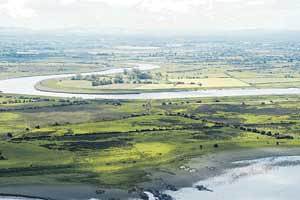
IN response to incidents in the Shannon Estuary that arise from oil spillages, the Limerick branch of Birdwatch Ireland held a meeting recently in Shannon Rowing Club,
which was attended by Pauline Beades of the Sea-Apt, Irish Seal Sanctuary, river warden, Pat Lysaght, Dr Stephen Newton and Dave Watson of Birdwatch Ireland, as well as members of the trained Oiled Birds’ Response Unit.
Dr Newton presented a series of slides showing the impact caused to the environment and wildlife from major and minor spills and the role of the trained response team was discussed, as well as the role that local birdwatchers can play in such a situation.
“Limerick branch members of Birdwatch outlined the major and minor bird watching sites along the Limerick side of the estuary, in terms of both species variety and counts,” says Maura Turner, secretary, Limerick Branch of Birdwatch Ireland.
“Information was provided on local access to sites and distances, in terms of potential response times to an incident and. Sea-Apt outlined the equipment which they have donated to the Irish Seal Sanctuary in order to respond effectively to an incident – this equipment is in storage in Foynes.”
A special training exercise is being organised for April.
“The meeting, which will be held at Moneypoint, will consist of both a desktop planning exercise and an on-the-ground response to a staged incident and this will be followed by a training exercise in Poulnasherry Bay.”
Ms Turner said that additional volunteers are required by the response team.
“Duties will include: being contacted in the event of an emergency and responding by travelling to the rendezvous point:
“Each volunteer must have a kit of emergency supplies available in their car at all times, to include: pen, notebook, wellingtons, high viz vest/armband: some cardboard boxes with holes cut in the side, a large black bag: taking notes in terms of scale of the incident, damage seen, etc: scaring birds away from contaminated feeding areas: collecting live birds if required and collecting and documenting dead birds if required.”
Emphasising that all other activities required in the rehabilitation of birds, cleaning them etc will be performed by members of the trained oiled birds committee and trained veterinary surgeons, Birdwatch Limerick says that Sea-Apt will train new members to the response unit on a bi-annual basis.
“This means that there will be other opportunities in the future to get more involved in the hands-on activities,” says Ms Turner who adds:
“Please note that if you are ever first on the scene of an incident or discover an incident, please report it immediately to Birdwatch Ireland who can in turn notify the relevant bodies and organise a consolidated approach to the response.
“Please do not ever put yourself in any danger by acting on your own or without direction and please await the trained response team and their instructions on how you can be of assistance.”
Anyone interested in volunteering either for the April training course or on an ongoing basis, can contact Maura Turner by emailing: birdwatchirelandlimerickbranchgmail.com


